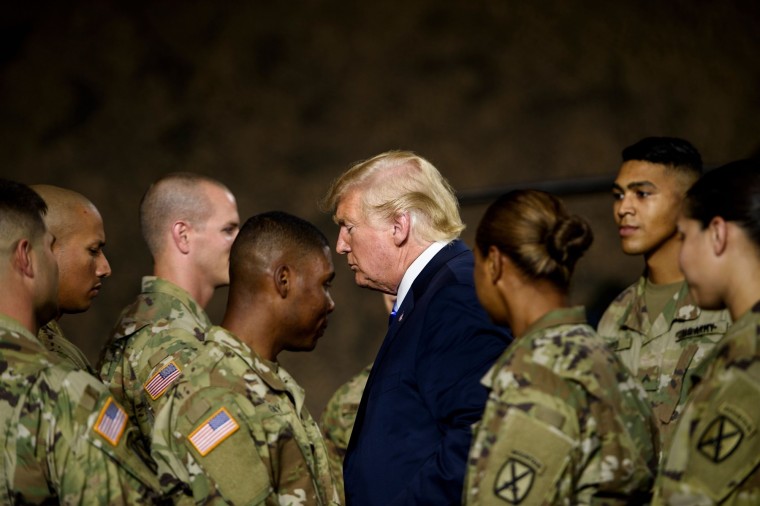About two years ago, Donald Trump delivered a prime-time address on his administration's "new" strategy for the war in Afghanistan. As we discussed at the time, the remarks included plenty of words, though they didn't amount to much.
The president, using language that was effectively identical to George W. Bush's war rhetoric, presented a plan in which the war in Afghanistan would continue indefinitely, with undetermined troop levels, until we "win" -- which was itself problematic, since Trump never explained what a victory would look like or how his latest strategy would achieve this goal.
Two years later, the president sat alongside Pakistani Prime Minister Imran Khan in the Oval Office, where he shed new light on his perspective on the longest war in American history.
"If we wanted to fight a war in Afghanistan and win it, I could win that war in a week. I just don't want to kill 10 million people. Does that make sense to you? I don't want to kill 10 million people."I have plans on Afghanistan that, if I wanted to win that war, Afghanistan would be wiped off the face of the Earth. It would be gone. It would be over in -- literally, in 10 days. And I don't want to do -- I don't want to go that route."
He added soon after, "If we wanted to, we could win that war. I have a plan that would win that war in a very short period of time.... If we wanted to be soldiers, it would be over in 10 days. One week to 10 days, if we wanted to. But I have not chosen that."
This made far less sense than Trump seemed to realize. To hear the president tell it, there's a secret plan available to him that would entail killing 10 million people in Afghanistan and effectively wiping the country "off the face of the Earth."
And while I'm delighted Trump doesn't want to do this, it's unsettling that he repeatedly yesterday described this scenario as a way in which the United States could, at least in theory, "win" the war quickly.
Putting aside questions as to how, exactly, the Republican would go about killing 10 million people in 10 days -- perhaps he was referring to nuclear weapons? -- the president seemed to be operating from a rather twisted definition of "victory."
Obliterating a country we're trying to help and "winning" a war are not the same thing.
All of this comes just two weeks after Fox News asked Trump whether he envisions removing all U.S. troops from Afghanistan. As regular readers may recall, the president's answer meandered a bit before eventually concluding:
"I'll give you a tough one. If you were in my position and a great-looking, central-casting – and we have great generals – a great central-casting general walks up to your office, I say, 'We're getting out.' 'Yes, sir. We'll get out. Yes, sir.'"I'll say, 'What do you think of that?' 'Sir, I'd rather attack them over there than attack them in our land.' In other words, them coming here. That's always a very tough decision, you know, with what happened with the World Trade Center, et cetera et cetera."When they say that, you know, no matter how you feel, and you and I feel pretty much very similar. But when you're standing there, and you have some really talented military people saying, 'I'd rather attack them over there than have them hit us over here and fight them on our land.' It's something you always have to think about."
So, if Trump spoke to military leaders who weren't "great-looking, central-casting" generals, maybe he wouldn't think this is "a tough one"?
His answer made it seem as if he has an instinct about the proper policy, but the Commander in Chief is reluctant to disappoint the military officials who carry out his orders.
